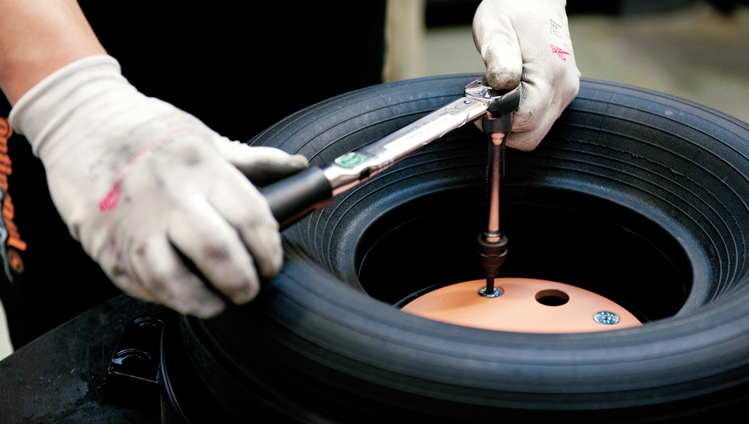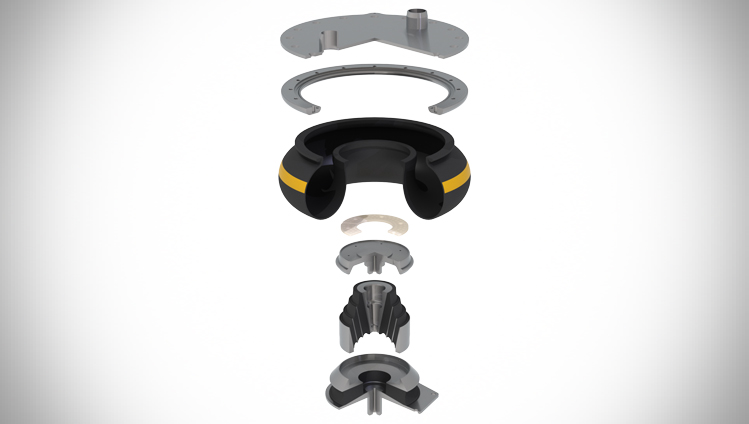New purchase or industrial reconditioning? Every few years, the time comes to replace components in trains and rails – including the secondary suspension. The purchase of spare parts is an expensive issue for rail vehicle operators. But there is another way: Continental is offering industrial reconditioning of air spring systems. This is economical and, at the same time, sustainable.
"Fortunately, the ecological aspects are becoming increasingly important for companies in this day and age," says the Head of Sales at Fahrzeug-Technik Hattingen, Timo Malers. "A railway operator who is aiming for the sustainable use of resources should always consider refurbishment as an alternative to new components." As a long-standing employee of the wholesaler of spare parts and components for rail vehicles, Fahrzeug-Technik Hattingen, Malers knows the needs of the customers and says the refurbishment service is more in demand than ever. "We have various inquiries from rail and tram companies for the industrial reconditioning of air spring systems – from small orders to projects with several hundred units."
 |
Timo Malers, who is Sales Manager at the wholesaler Fahrzeug-Technik Hattingen:
"The advantages of the refurbishment are obvious: it is environmentally friendly and cheaper for the customer. As an original equipment manufacturer in the vehicle fleets of rail companies, Continental enjoys a very good reputation in terms of quality and expertise. In terms of refurbishment, we have also decided to take the path together with Continental." |
|
What is refurbishment?
The refurbishment service offered by Continental enables the recycling of intact air spring components. In this industrial reconditioning process, our experts professionally dismantle the existing system, check the individual parts, and evaluate reusability. A new air bellows, a new MEGI auxiliary spring and the necessary add-on parts are installed onto the system components that are still intact. Finally, experts check the complete air spring system in a testing machine with the latest technology. "Thanks to our years of expertise as an original equipment manufacturer in the railway industry and the technological equipment for the required products, we are able to rework the secondary suspension to OEM quality," explains the Product Manager in the Air Spring Systems division at Continental, Jamal Issa. "This means we can even provide a guarantee for all newly-installed components and system impermeability."
Advantages of the reprocessing of air spring systems: quick and inexpensive
 Is the air spring system in your rail vehicle in need of an overhaul? It doesn't always have to be a new one. There are numerous factors in favor of the recycling of air spring components. As a result of the reconditioning, the secondary suspension is available 30 to 60 percent faster than a new system would be, and the costs are 25 to 50 percent lower. Recycling also protects the environment. "Thanks to expert dismantling, state-of-the-art technology, and the right expertise, we can reuse 50 to 100 kg of metal in each air spring system, depending on the condition," explains Issa.
Is the air spring system in your rail vehicle in need of an overhaul? It doesn't always have to be a new one. There are numerous factors in favor of the recycling of air spring components. As a result of the reconditioning, the secondary suspension is available 30 to 60 percent faster than a new system would be, and the costs are 25 to 50 percent lower. Recycling also protects the environment. "Thanks to expert dismantling, state-of-the-art technology, and the right expertise, we can reuse 50 to 100 kg of metal in each air spring system, depending on the condition," explains Issa.
Environmental protection thanks to refurbishment
 Recycling eliminates not only the disposal of the scrap metal, but also the manufacture of new steel and aluminum components. For each air spring system for rail vehicles, Continental’s industrial reconditioning saves at least 300 kg of CO2. This is similar to the emissions of a plane on the Hanover-London route. The facts speak for themselves: Continental’s refurbishment service is making the rail industry greener. This is also confirmed by customer comments: "The feedback regarding the refurbishment is positive," explains Malers. "The quality of the reworked air spring systems is high. And, of course, customers appreciate being able to operate in an environmentally sustainable manner and at the same time cost-effectively."
Recycling eliminates not only the disposal of the scrap metal, but also the manufacture of new steel and aluminum components. For each air spring system for rail vehicles, Continental’s industrial reconditioning saves at least 300 kg of CO2. This is similar to the emissions of a plane on the Hanover-London route. The facts speak for themselves: Continental’s refurbishment service is making the rail industry greener. This is also confirmed by customer comments: "The feedback regarding the refurbishment is positive," explains Malers. "The quality of the reworked air spring systems is high. And, of course, customers appreciate being able to operate in an environmentally sustainable manner and at the same time cost-effectively."